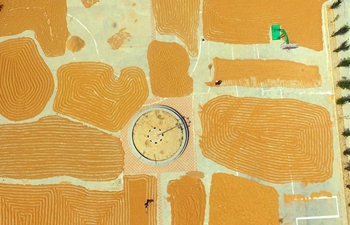WASHINGTON, June 7 (Xinhua) -- A study published on Thursday in the journal Science revealed the biomarkers in maternal blood which can accurately identify pregnant women going on to deliver babies up to two months prematurely.
The blood biomarkers could also estimate gestational age or delivery date with comparable accuracy to ultrasound, but possibly at lower cost, according to the study funded by March of Dimes, a New York-based nonprofit organization that works to improve the health of mothers and babies.
Premature birth affects 15 million babies each year worldwide and is on the rise in the United States, according to the researchers.
David K. Stevenson, the principal investigator of the March of Dimes Prematurity Research Center at Stanford University, described the non-invasive blood test approach as a way of "eavesdropping on a conversation" between the mother, the fetus and the placenta, without disturbing the pregnancy.
He said that the findings affirmed the existence of a "transcriptomic clock of pregnancy" that could serve as a new way to assess the gestational age of a fetus.
"By measuring cell-free RNA in the circulation of the mother, we can observe changing patterns of gene activity that happen normally during pregnancy, and identify disruptions in the patterns that may signal to doctors that unhealthy circumstances like preterm labor and birth are likely to occur," Stevenson said.
"With further study, we might be able to identify specific genes and gene pathways that could reveal some of the underlying causes of preterm birth, and suggest potential targets for interventions to prevent it," he added.
In two separate cohorts of women, all at elevated risk of delivering preterm, the research team identified a set of cell-free RNA (cfRNA) transcripts that accurately classified women who delivered preterm up to two months in advance of labor.
In another cohort of healthy pregnant women, the team found that measurement of nine cfRNA transcripts in maternal blood could predict gestational age with comparable accuracy to ultrasound.
The researchers noted, however, that both tests will require validation in larger, blinded clinical trials.

















